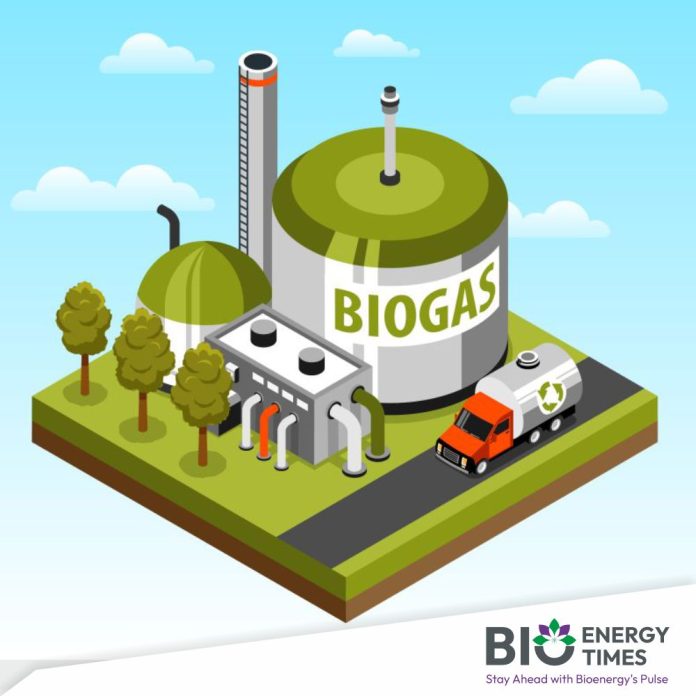Digest P3 enzyme complex acts to boost biogas production and quality in AD operations

Brian and Thomas Lockhart have successfully operated a 500kW anaerobic digestion (AD) plant in Co Armagh for nearly nine years, achieving over 98% efficiency. The feedstock primarily includes potato waste, grass silage, and chicken litter. To enhance biogas production, they introduced Alltech’s Digest P3 enzyme complex, which improves fiber digestion and reduces the formation of floating layers in the digester. This enzyme has proven effective in maximizing biogas yields while allowing flexibility in feedstock formulation.
The success of all Anaerobic Digestion (AD) operations is dependent on the systems’ ability to extract biogas from the feedstocks used as the initial energy source.
Brian Lockhart and his son Thomas have been successfully managing a 500kW AD operation on the outskirts of Craigavon in Co Armagh for almost 9 years.
“The biogas produced by the plant is used to produce green electricity for the national grid,” Brian explained.
“From the very start, the system has been achieving 98% plus levels of efficiency.”
The feedstock used to fuel the AD plant comprises a mix of potato waste, grass silage and chicken litter.
Brian takes up that story: “Over recent years, the contribution made by potato waste to the overall mix has reduced with the difference made up by increased levels of grass silage.
“Potato waste delivers a very readily available source of energy for the microbes in the digester, whereas the silage represents a much slower release energy source.
“So changes to the way in which the plant was managed were required. Silage also contains much higher levels of fibre than potato waste.
“And it was important that we found ways of extracting the maximum levels of biogas possible from all the grass silage that we were including in the feed stock mix.”
The solution to this challenge was provided by Alltech, courtesy of its ‘Digest P3’ enzyme complex.
The company’s Adam Smyth was a recent visitor to the Lockharts’ AD operation. He explained: “Digest P3 can have a beneficial impact on an AD plant in a number of ways.
“One example, visible at Lockharts’ AD,is the enzyme complex helps the AD microbes produce more gas from an existing feedstock and secondly it supports the plant to produce a higher quality biogas.
“In both cases, improved fibre digestion is at the heart of the process.”
Another benefit, and one of the most visible impacts made by Digest P3 is the disappearance of floating layers with the digester tank.
Brian Lockhart agrees: “We have been using the enzyme mix for the past 18 months,” he confirmed. “And it made an almost immediate difference in the operation of the plant within days of its inclusion with the feed stock mix.
“A floating layer had started to form when increased levels of grass silage were included in the feedstock mix. This disappeared within days of the Digest P3 being added to the feed stock on a daily basis.”
But more than this the biogas production levels generated by the plant were fully maintained in the wake of changing the feedstock specification.
“We add two 500g sachets of the product to the plant on a daily basis. The bags are totally biodegradable, so they can be added directly, without having the hassle of opening them in the first place. It’s simply a case of placing the Digest P3 bags with the silage as it is fed into the digester.”
Digest P3, used by AD operators throughout Europe, has also shown to aid digestate management. Significantly, the impact of the enzyme mix on the fibre fraction of grass silage substrates has been assessed by on farm field trials carried out in Northern Ireland.
“The work was carried out at an AD operation where the digestate is put through a physical separation process prior to its spreading on land.
“The trial showed that the volume of solid materials produced by the separation process reduced significantly post the application of Digest P3 to the digester.
“This confirms higher rates of digestion are achieved within the fibrous components of the silage, courtesy of Digest P3.”
According to the Alltech representative, the enzyme complex works by aiding methane-generating microflora to break down feedstock components previously inaccessible through digestion.
He added: “This enhanced feed breakdown allows for more readily available energy and protein for the microflora, resulting in additional biogas volumes from the same amount of feed input.”
Digest P3 also allows for flexibility in AD feedstock formulation through the inclusion of different by-products and alternative raw materials.
Digest P3 is distributed in Northern Ireland by United Feeds. Company agronomist Chloe Kyle joined Adam Smyth during his visit to the Lockhart AD plant.
She said: “Demand for Digest P3 continues to grow. AD operators know they must extract the maximum possible levels of biogas from the feedstock mixes they are using. Digest P3 has a proven track record in making this happen.”
Source Link : https://www.farminglife.com/business/digest-p3-enzyme-complex-acts-to-boost-biogas-production-and-quality-in-ad-operations-4825751

















